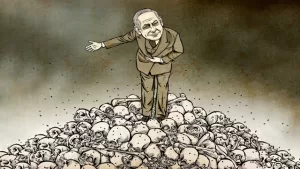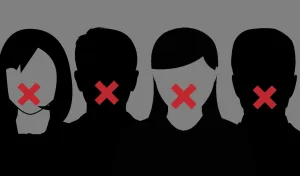Prime Minister Narendra Modi made a statement on March 26 – at the 50th National Day Celebration of Bangladesh, where he was an invited guest – asserting that he had been jailed in 1971 for his participation in a ‘satyagraha’ with friends in support of the independence of Bangladesh.
While this assertion was greeted with both derision as well as admiration, depending on how one retrospectively views the political capacities of the 21-year-old Narendra Modi, it may be worthwhile to look at the events of 1971 more closely, to scrutinise Modi’s attempts to insert himself into the history of struggle for Bangladesh.
The ‘Independence of Bangladesh’ had been announced on ‘Swadhin Bangla Betar Kendra / Radio Centre’ from Kalurghat Radio Station in Chittagong by then Major Zia ur Rahman on March 27, 1971.
This followed the declaration of martial law in East Pakistan in the wake of widespread disaffection arising from the annulment of the results of Pakistan’s 1970 general election, which saw the mainly East Pakistan-based Awami League win a majority.
Sheikh Mujibur Rahman had already been arrested in Dhaka on the midnight between March 24 and March 25, 1971 and flown to prison in Rawalpindi, West Pakistan.
Operation Searchlight, the Pakistan Army’s mass killings to ‘clean up’ East Pakistan of opposition began on March 25.
The killings on that day included the massacre of a very large number of East Bengali intellectuals and academics, including those of Dhaka University.
Indira Gandhi, India’s prime minister at the time, moved a resolution in parliament drafted by her principal secretary, P.N. Haksar. The resolution said that the Indian parliament expressed ‘whole hearted sympathy and support for the people of East Bengal’. Sensitive to the flux of international realpolitik, the resolution stopped short of endorsing the ‘declaration of independence of Bangladesh’ that had been made in the radio announcement by Zia Ur Rahman just four days before.
Mrs. Gandhi had already had a meeting with the principal opposition leaders on March 26, 1971 where she had discussed the limited options available to the Indian government. She told the opposition leaders that whatever steps may be contemplated by the Indian government in response to the escalating situation in East Pakistan should not be a matter of public debate – as that would ‘defeat the purpose of giving such comfort as we can to democratic forces in Pakistan as a whole’. She pointed out that Pakistan was a sovereign member of the United Nations, and that the taking of immediate and precipitate steps by India would be unlikely to find favour, or support, internationally.
The Indian government’s authorised ‘Official History of the 1971 War’ has many details of the turbulence in the Indian political and government scene with regard to the question of conferring immediate recognition to the ‘independence of Bangladesh’.
Events moved quickly after the last week of March, 1971.
Tajuddin Ahmed, the senior East Bengali opposition leader who would go on to be the acting head of the Provisional Government of Bangladesh, met Prime Minister Indira Gandhi on April 3, 1971. He was promised all help. The ground work for this meeting had been done by among others, Ashok Mitra (then economic adviser to the Prime Minister, later CPI(M) minister in West Bengal), Amartya Sen (then Professor at Delhi School of Economics), P.N. Haksar (principal secretary to the prime minister) and two East Bengali economists, Anisur Rehman and Rahman Sobhan, both personally known to Mitra and Sen, who had somehow managed to escape to Delhi from Dhaka.
Also, in April 1971, General, later Field Marshall ‘Sam’ Maneckshaw, then Indian Army chief, bluntly told Prime Minister Indira Gandhi that the Indian army was not prepared to enter a war immediately and that he needed a few months’ time. Mrs. Gandhi, who was of a similar view herself, took his advice and played for time.
Meanwhile, the ‘Provisional Government of Bangladesh’ was declared in the town of Baidynathtola (renamed Mujibnagar) in East Pakistan on April 10, 1971.
The names of the members of the ‘cabinet’ of this provisional government were declared on April 17. They relocated shortly after to Calcutta, in India, where they operated from a building on 8, Theatre Road (now Shakespeare Sarani).
The Indian Government delayed conferring ‘formal recognition’ to the Provisional Government of Bangladesh as that would be considered an ‘act of war’ by Pakistan. At that time, in the event of war being declared, Pakistan had the promise of support of the United States and China.
To sum up, the Government of India did not confer formal recognition to the Provisional Government of Bangladesh, because it wanted to (a) buy time to make proper war plans (as suggested by Maneckshaw) and b) insulate Mujibur Rahman, then imprisoned in West Pakistan, from treason charges and the execution of a death sentence, which would immediately follow such charges. Nevertheless, it allowed the Provisional Government of Bangladesh to operate under its protection from Calcutta. It also hosted the roughly six million East Bengali refugees, including Mukti Bahini fighters, who fled into West Bengal in India after Operation Searchlight began.
However, Indian Intelligence agencies, paramilitary forces and finally the Indian Army began aiding and supplying East Bengali Mukti Bahini fighters, first informally (mainly Border Security Force) from March 1971, and then with some formality, with the Eastern Command of the Indian Army operationalising Operation Jackpot, from May 1971 onwards, thereby laying the ground for joint operations between Indian army soldiers acting without uniforms and Mukti Bahini irregulars.
Meanwhile, Mrs. Gandhi traveled the world to try and build up the case for Bangladesh, in support of Indian intervention, and against Pakistan.
The first significant diplomatic dividend of this effort was the securing of the India-USSR treaty of Friendship, which committed the USSR to supporting India in the event of India being dragged into war. This was a major guarantee for the success of the build-up of the Indian war effort.
The US was determined to push the region into war early, as that would have been to its strategic ally Pakistan’s advantage. The CIA used its clients in India (which included a mole inside Mrs. Gandhi’s cabinet) to try and muster a consensus around the position that the India-USSR treaty was a betrayal of Bangladesh as the USSR would not allow India to ‘recognise’ Bangladesh. This was faithfully reported in cables from the CIA station in Delhi to superiors in Washington and Langley. In all probability the CIA station was telling the mole what to say, and then reporting what the mole said, as an index of its penetration into the uppermost echelon of power in India at the time.
Curiously, this position – that the India-USSR Treaty was a ‘betrayal’ of the ‘Bangladesh Cause’ – was also the line taken by the Right Wing opposition party, the Bharatiya Jan Sangh, parent of today’s Bharatiya Janata Party. This may be readily gleaned from two Jana Sangh documents, ‘Recognise Swadhin Bangladesh’ (July 2, 1971) and ‘Indo-Soviet Treaty, August 13, 1971, Delhi, Central Working Committee,’ both, cited by Rahul Sagar in his 2019 essay, ‘Hindu Nationalism and the Cold War’.
The Jan Sangh, the RSS, and its leaders, particularly Atal Bihari Vajpayee, were pushing publicly, and in parliament, for an early commencement of hostilities. They either did not know, or pretended not to know that this would do immense harm to the armed struggle being waged within East Pakistan, with covert Indian military support, by the Mukti Bahini, as it would immediately draw the US and China into direct support for Pakistan.
The notion that the Jan Sangh and Vajpayee, were naive and did not understand the implications of what they were doing is the generous explanation. Less charitable explanations could also be offered.
And so, a ‘Recognise Bangladesh Satyagraha’ of August 1 – 11th, 1971 undertaken by the Jan Sangh in Delhi, which culminated in a rally to protest against the India-USSR Treaty of Friendship which had been signed three days earlier, on August 9, 1971 was a set of moves that sought to jump the gun on Bangladesh. It’s primary objective was to agitate for war, despite the lack of preparation, and also to steer public opinion against the Indo-Soviet Treaty – which the Jan Sangh wanted to prove was a ‘betrayal of Bangladesh’. The Times of India reported at the time that Vajpayee spoke at a massive rally in Delhi on August 12, 1971 and said that the Indo-Soviet treaty implied ‘a conspiracy between Delhi and Moscow to deny recognition to Bangladesh’.
This is the ‘Satyagraha’ which Narendra Modi is claiming to have participated in. He has spoken about this in an earlier trip to Bangladesh as well – when he went to receive Bangladesh’s highest civilian award on behalf of the ailing Atal Behari Vaipayee (the citation of this award also refers to the Jan Sangh Satyagraha of August 1971.
It is also being being claimed that Modi actually wrote this in Sangharsh Maa Gujarat, a book published in 1978. However, native Gujarati speakers who have read the 2000 edition of the book (available as a PDF on Modi’s web page) report that the book makes no mention of this, even though ‘imprisonment in Tihar Jail due to participation in Bangladesh Satyagraha’ is mentioned, in passing, as part of the then young author’s ‘achievements’ in the short author’s bio note printed on the back cover.
What is curious is the coincidence of the Jan Sangh’s position with that of the ‘mole’ in Mrs. Gandhi’s cabinet in 1971 – the bogus suggestion that the Indo-Soviet treaty would make it harder for India to recognise Bangladesh.
Modi, a young man of 21 in 1971, may or may not have then had the delusions of grandeur that he certainly has now. It is hard to say whether or not his possible involvement in this ‘Satyagraha’ of August 1971 and the undertaking of the hallowed Indian ritual of ‘courting arrest’ was impelled by an overflowing of emotions in favour of the emancipation of East Bengal. What is certain is that the protest he was part of was furthering a demand that would have weakened India’s ability to wage war later that year for the liberation of Bangladesh.
Had India entered the war with a US-and-China-backed-Pakistan prematurely, even as late as August 1971, instead of in December 1971, as the Jan Sangh wanted it to, it is quite possible that Pakistan would have prevailed and that Bangladesh would not have attained actual independence in December. So when Modi says that he acted to support Bangladesh’s independence when he was 21 years old, perhaps he is letting his imagination get the better of reality. But we have come to expect that of him, anyway, by now.
(Courtesy: The Wire.)




